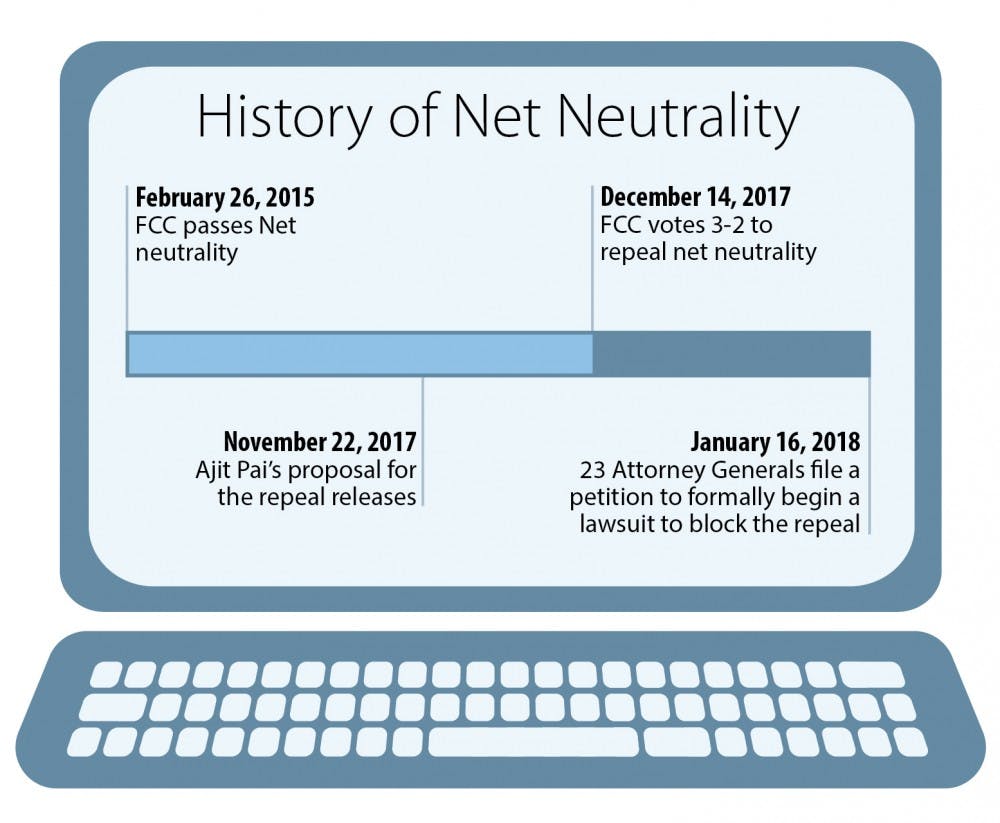“Instead, the FCC would simply require Internet service providers to be transparent about their practices so that consumers can buy the service plan that’s best for them and entrepreneurs and other small businesses can have the technical information they need to innovate,” he said.
Mariam Turner, UNC-Chapel Hill law student and Pruden Fellow in the UNC School of Media and Journalism, said in an ideal world, the internet without net neutrality would just be the internet because under the free market there would be no real difference.
“In reality, the issue we have is that the free market isn’t going to work so well because all the providers we have are basically monopolizing various areas,” she said.
Sarah Gillooly, director of political strategy and advocacy for the American Civil Liberties Union of North Carolina, said net neutrality is the main way Americans express their free speech rights in the 21st century.
“History tells us that unless those ISPs, the internet providers, are forced through net neutrality rules to allow for free speech, they will discriminate against certain kinds of content,” Gillooly said.
She said net neutrality is particularly critical for marginalized communities because they rely on a free and open internet to organize, communicate and fight systemic discrimination.
Jim Gogan, assistant vice chancellor for UNC Information Technology Services Communication Technologies, explained what could happen without net neutrality.
He said if Spectrum, which has pay-per-view movies, doesn’t want people to have access to Netflix, at some point they may want to either charge more to be able to access Netflix or slow network traffic so people get frustrated and give up trying to load Netflix.
Gogan said that, although Ajit Pai claims things like this won’t happen because it was stopped when it happened in the past, the reason these limits were stopped was because of net neutrality.
Gogan said this rollback will only impact students who live off campus and get their service from ISPs such as Spectrum, AT&TInc. or Comcast Corp. Students on campus are on the campus network, which is independent from other entities. Campus internet connections run through like Internet2, which will continue to follow net neutrality regulations whether they are required or not.
He said internet users will have to monitor their quality of service.
“The companies, the internet service providers, aren’t going to tell you, ‘Oh, we’re going to start throttling traffic now because we want to favor this kind of traffic instead,’” he said. “I think it’s going to require the users of the services to be more vigilant in terms of things that aren’t looking right.”
To get the day's news and headlines in your inbox each morning, sign up for our email newsletters.
Response to the vote
North Carolina Attorney General Josh Stein and 22 other state attorneys general filed a petition Jan.16 to formally begin a lawsuit against the FCC and the federal government to block the repeal of net neutrality.
The petition said the repeal is arbitrary, capricious and an abuse of discretion within the meaning of the Administrative Procedure Act.
“[It] violates the federal law including, but not limited to, the Constitution, the Communications Act of 1934, as amended, and FCC regulations promulgated thereunder,” the petition said.
The two commissioners who voted against Pai’s order, Mignon Clyburn and Jessica Rosenworcel, have expressed concern about the outcome of the vote.
Clyburn said in a statement there has been unprecedented public support for keeping net neutrality regulations.
“Because the public can plainly see, that a soon-to-be-toothless FCC, is handing the keys to the internet – the internet, one of the most remarkable, empowering, enabling inventions of our lifetime – over to a handful of multi-billion dollar corporations,” Clyburn said.
The ACLU is petitioning Congress to reverse to the FCC’s action using the Congressional Review Act. Congress has 60 legislative days after the vote to do so.
A group of bipartisan congresspersons are asking the FCC to cancel its vote to repeal net neutrality. Their letter to the FCC said the proposed order is based on flawed and factually inaccurate understandings of internet technology.
“The FCC’s rushed and technically incorrect proposed order to abolish net neutrality protections without any replacement is an imminent threat to the internet we worked so hard to create," the letter said. "It should be stopped."
@BaileySAldridge
state@dailytarheel.com



